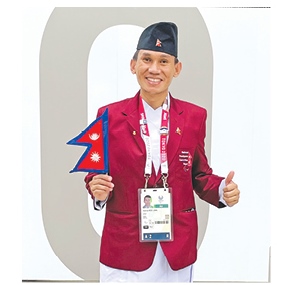Coach Kabiraj thinks government support necessary to develop Para-sports

By A Staff Reporter
Kathmandu, Jan 21 : Kabiraj Negi Lama started practising taekwondo so he could join Nepal Army.
However, his short height and lightweight denied him the job in Army. That disadvantage hit him during his playing career too.
Negi then satisfied himself by coaching taekwondo in schools until his friends Kalyan Kunwar and Deepak Bista motivated him to join Para-taekwondo.
Now he is a Level-II certified coach of World Para-taekwondo. National Coach Kunwar is the one who introduced Para-taekwondo in Nepal. Bista, who won four SAG gold medals, is the most successful taekwondo player in the nation.
Negi, who joined Para-taekwondo as a volunteer coach, has not thought he would get an international platform and recognition in national sports.
“I have not expected that one day I will be coaching players in the Paralympics and world championship.”
As a team coach, Negi took part in Tokyo 2020 Paralympics Games, Bahrain 2021 Asian Youth Para Games, eighth World Para-Taekwondo and third Asian Para-Taekwondo.
His pupil Palesha Goverdhan won the Repechage match against the USA and Serbian athletes in Tokyo Paralympics.
Under Negi’s tutelage, Palesha earned the gold medal in Bahrain. Shrijana Ghising and Bishal Garbuja also won silver and bronze medals in Bahrain.
His student Bikram Shrestha bagged the Bronze medal in the Poomsae category at the eighth World Para-Taekwondo. During the third Asian Para-Taekwondo held in 2017 in Korea, his student Ranjana Dhami also brought home bronze.
Para taekwondo coach Negi remembers representing Nepal in the Paralympics and winning medals from his pupils in World and Asian games as his best moments of life.
Negi himself had won a gold medal in the Poomsae as a player during the ninth Jeju International Sports for all Taekwondo Championship in 2009.
He believes the success of the coach and players is interdependent. “The hard work of both coach and player is necessary to achieve the success.”
Negi, however, rue over the lack of players and lack of investment in the upliftment of Para games in Nepal.
“There is a handful of para players in Nepal. Due to the lack of players, organising national games is unlikely now. It is difficult to manage players for a single category, forget about the national events.”
He, however, says players from remote areas of the country are eager to join the Para taekwondo after recent international success.
“After recent international achievements, many disabled players from remote areas are eager to join the para taekwondo. But taekwondo association cannot afford to keep them in Kathmandu and train them.”
He thinks government support is necessary to develop Para-sports. “Para-athletes require the special facilities to train. These facilities should be available throughout the nation, not in the capital only.”
Negi suggests government and sports governing bodies raise the investment in para-sports. He also laments for para-athletes not getting their due recognition from the government despite bringing home international laurels. “No one is interested in honouring and motivating Para-athletes.”
Recent News

Do not make expressions casting dout on election: EC
14 Apr, 2022
CM Bhatta says may New Year 2079 BS inspire positive thinking
14 Apr, 2022
Three new cases, 44 recoveries in 24 hours
14 Apr, 2022
689 climbers of 84 teams so far acquire permits for climbing various peaks this spring season
14 Apr, 2022
How the rising cost of living crisis is impacting Nepal
14 Apr, 2022
US military confirms an interstellar meteor collided with Earth
14 Apr, 2022
Valneva Covid vaccine approved for use in UK
14 Apr, 2022
Chair Prachanda highlights need of unity among Maoist, Communist forces
14 Apr, 2022
Ranbir Kapoor and Alia Bhatt: Bollywood toasts star couple on wedding
14 Apr, 2022
President Bhandari confers decorations (Photo Feature)
14 Apr, 2022











